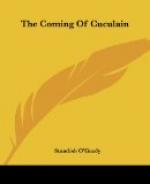At one extremity of the vast hall, upon a raised seat, sat their young king, Concobar Mac Nessa, slender, handsome, and upright. A canopy of bronze, round as the bent sling of the Sun-god, the long-handed, far-shooting son of Ethlend, [Footnote: This was the god Lu Lam-fada, i.e., Lu, the Long-Handed. The rainbow was his sling. Remember that the rod sling, familiar enough now to Irish boys, was the weapon of the ancient Irish, and not the sling which is made of two cords.] encircled his head. At his right hand lay a staff of silver. Far away at the other end of the hall, on a raised seat, sat the Champion Fergus Mac Roy, like a colossus. The stars and clouds of night were round his head and shoulders seen through the wide and high entrance of the dun, whose doors no man had ever seen closed and barred. Aloft, suspended from the dim rafters, hung the naked forms of great men clear against the dark dome, having the cords of their slaughter around their necks and their white limbs splashed with blood. Kings were they who had murmured against the sovereignty of the Red Branch. Through the wide doorway out of the night flew a huge bird, black and grey, unseen, and soaring upwards sat upon the rafters, its eyes like burning fire. It was the Mor-Reega, [Footnote: There were three war goddesses:—(1) Badb (pronounced Byve); (2) Macha, already referred to; (3) The Mor-Rigu or Mor-Reega, who wag the greatest of the three.] or Great Queen, the far-striding terrible daughter of Iarnmas (Iron-Death). Her voice was like the shouting of ten thousand men. Dear to her were these heroes. More she rejoiced in them feasting than in the battle-prowess of the rest.
When supper was ended their bard, in his singing robes and girt around the temples with a golden fillet, stood up and sang. He sang how once a king of the Ultonians, having plunged into the sea-depths, there slew a monster which had wrought much havoc amongst fishers and seafaring men. The heroes attended to his song, leaning forward with bright eyes. They applauded the song and the singer, and praised the valour of the heroic man [Footnote: This was Fergus Mac Leda, Fergus, son of Leda, one of the more ancient kings of Ulster. His contest with the sea-monster is the theme of a heroic tale.] who had done that deed. Then the champion struck the table with his clenched hand, and addressed the assembly. Wrath and sorrow were in his voice. It resembled the brool of lions heard afar by seafaring men upon some savage shore on a still night.
“Famous deeds,” he said, “are not wrought now amongst the Red Branch. I think we are all become women. I grow weary of these huntings in the morning and mimic exercises of war, and this training of steeds and careering of brazen chariots stained never with aught but dust and mire, and these unearned feastings at night and vain applause of the brave deeds of our forefathers. Come now, let us make an end of this. Let us conquer Banba




